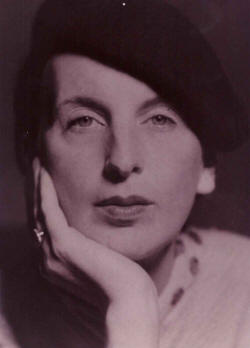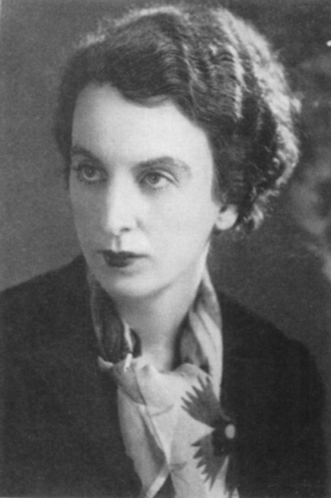

Queer Places:
Villa Coustille, Col de Villefranche, 06230 Villefranche-sur-Mer
 Kay Boyle (February 19, 1902 – December 27, 1992) was an American novelist, short story writer, educator, and political activist.[2] She was a Guggenheim Fellow and O. Henry Award winner.
For a while, Kay Boyle
lived comfortably as the secretary to
Gladys Milton Palmer, heir to the Palmer biscuit
company fortune and at the time Princess or Dayang Muda of Sarawak. Boyle,
however, was drawn to a commune outside Paris in Neuilly organized by Raymond
Duncan, brother of Isadora Duncan and
later she started a relationship with the married couple
Caresse Crosby and
Harry Crosby.
Kay Boyle (February 19, 1902 – December 27, 1992) was an American novelist, short story writer, educator, and political activist.[2] She was a Guggenheim Fellow and O. Henry Award winner.
For a while, Kay Boyle
lived comfortably as the secretary to
Gladys Milton Palmer, heir to the Palmer biscuit
company fortune and at the time Princess or Dayang Muda of Sarawak. Boyle,
however, was drawn to a commune outside Paris in Neuilly organized by Raymond
Duncan, brother of Isadora Duncan and
later she started a relationship with the married couple
Caresse Crosby and
Harry Crosby.
The granddaughter of a publisher, Boyle was born in St. Paul, Minnesota, and grew up in several cities but principally in Cincinnati, Ohio. Her father, Howard Peterson Boyle, was a lawyer, but her greatest influence came from her mother, Katherine Evans, a literary and social activist who believed that the wealthy had an obligation to help the financially less fortunate. In later years Kay Boyle championed integration and civil rights. She advocated banning nuclear weapons, and American withdrawal from the Vietnam War.[2] Boyle was educated at the exclusive Shipley School in Bryn Mawr, Pennsylvania, then studied architecture at the Ohio Mechanics Institute in Cincinnati. Interested in the arts, she studied violin at the Cincinnati Conservatory of Music before settling in New York City in 1922 where she found work as a writer/editor with a small magazine.[2]
That same year, she met and married a French exchange student, Richard Brault, and they moved to France in 1923. This resulted in her staying in Europe for the better part of the next twenty years. Separated from her husband, she formed a relationship with magazine editor Ernest Walsh, with whom she had a daughter, Sharon, named for the Rose of Sharon, in March 1927, five months after Walsh's death from tuberculosis in October 1926.[3] In 1928 she met Laurence Vail, who was then married to Peggy Guggenheim. Boyle and Vail lived together between 1929 until 1932 when, following their divorces, they married. With Vail, she had three more children - daughters Apple-Joan in 1929, Kathe in 1934, and Clover in 1939.[3] During her years in France, Boyle was associated with several innovative literary magazines and made friends with many of the writers and artists living in Paris around Montparnasse. Among her friends were Harry Crosby and Caresse Crosby who owned the Black Sun Press and published her first work of fiction, a collection titled Short Stories. They became such good friends that in 1928 Harry Crosby cashed in some stock dividends to help Boyle pay for an abortion.[4] Other friends included Eugene and Maria Jolas. Boyle also wrote for transition, one of the preeminent literary publications of the day. A poet as well as a novelist, her early writings often reflected her lifelong search for true love as well as her interest in the power relationships between men and women. Boyle's short stories won two O. Henry Awards. In 1936, she wrote a novel, Death of a Man, an attack on the growing threat of Nazism. In 1943, following her divorce from Laurence Vail, she married Baron Joseph von Franckenstein, with whom she had two children - Faith in 1942 and Ian in 1943.[3] After having lived in France, Austria, England, and in Germany after World War II, Boyle returned to the United States.[2]

In the States, Boyle and her husband were victims of early 1950s McCarthyism. Her husband was dismissed by Roy Cohn from his post in the Public Affairs Division of the United States Department of State, and Boyle lost her position as foreign correspondent for The New Yorker, a post she had held for six years. She was blacklisted by most of the major magazines. During this period, her life and writing became increasingly political. She and her husband were cleared by the United States Department of State in 1957.[5] In the early 1960s, Boyle and her husband lived in Rowayton, Connecticut, where he taught at a private girls' school. He was then rehired by the State Department and posted to Iran, but died shortly thereafter in 1963. Boyle was a writer in residence at the New York City Writer's Conference at Wagner College in 1962. In 1963, she accepted a creative writing position on the faculty of San Francisco State College, where she remained until 1979.[6] During this period she became heavily involved in political activism. She traveled to Cambodia in 1966 as part of the "Americans Want to Know" fact-seeking mission. She participated in numerous protests, and in 1967 was arrested twice and imprisoned. In 1968, she signed the "Writers and Editors War Tax Protest" pledge, vowing to refuse tax payments in protest against the Vietnam War.[7] In her later years, she became an active supporter of Amnesty International and worked for the NAACP. After retiring from San Francisco State College, Boyle held several writer-in-residence positions for brief periods of time, including at Eastern Washington University in Cheney and the University of Oregon in Eugene. Boyle died at a retirement community in Mill Valley, California on December 27, 1992.[2]
My published books: